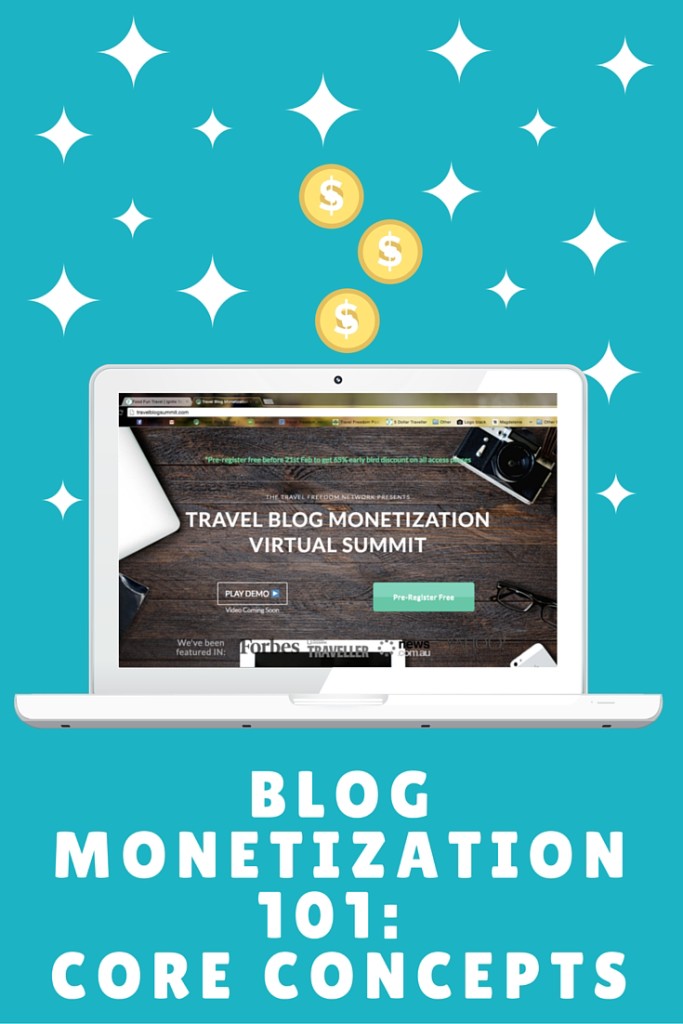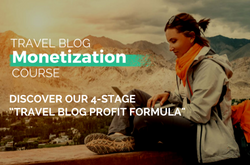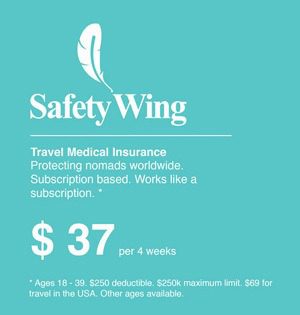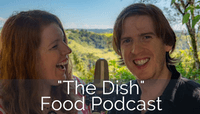RSS:Use this link in your RSS reader
Partial transcript for this episode is at the bottom of this article. It’s not as good as listening to the podcast, and you’ll miss out on the funny bits 😉
WE NEED YOUR FEEDBACK
We love to hear from listeners about how we can improve the show or what you love about it already.
In the Blog Monetization 101 Podcast:
- Is your blog set up to become monetizable?
- Is your brand a business?
- The two main categories of Blog Monetization
- Which break down into 5 central types of monetization
- How to choose which is right for your blog
For More on Monetization for Travel Bloggers, register for our Virtual Summit Below:
[magicactionbox]
Become part of the Travel Freedom community on twitter.
Tweet suggestions to @mytravelfreedom
#travelfreedom #travelmondays #moneymondays
Weblinks from Blog Monetization Podcast
World Nomads Insurance – Specifically designed for digital nomads, flashpackers, adventure & long term Travellers – Get a 5% Discount with our coupon code: FOOD5
travelfreedompodcast.com/blogmoney
The Everywhereist – great blog built on her own personality
Top Gear – the car show for all the motorheads out there. Formally hosted by Jeremy Clarkson, Richard, Hammond and James May….until Jeremy Clarkson punched a guy in the face over a steak (or lack of one)
Jeremy Clarkson – brand built entirely on his personality
Travel Blog Summit – Our very own brain child. Attend the first EVER Virtual Travel Blog Monetizaton Summit – coming in March
backpacking 4 Beginners – our information only site. No personality in this one, just backpacking basics for newbie travellers.
Authority For your Brand – Ep52
Podcast on Affiliate Sales Ep044
Commission Junction – now known as CJ affiliate
Bluehost -Amazing value web hosting from only $3.95 per month! Our site is powered by wordpress, the free blogging platform BUT you need a hosting package to host your wordpress install.Bluehost has been far more reliable than our previous host IX, and there system is really easy to use.
Optimizepress – Build great landing pages from right inside WordPress. Easy to use drag and drop page design. Flexible options and loads of templates. Create appealing pages and increase opt-ins to your website. It’s cheaper than leadpages and does a similar job.
Our New Course On Pitching and working with travel brands : travelblogsummit.com/pitching-masterclass-sales-page/
Love this podcast? Why not pin it on your favourite business/blogging Pinterest board
Partial Transcript
The Following is a partial transcript and is not edited for grammar or spelling.
In this episode…
We discuss the core monetization methods that are making bloggers an income.
So, if you are struggling to figure out how to make a profit from your blog? There are actually loads of methods, You also need to choose which are going to be the best fit for YOUR blog. We want to help you decide in this episode.
show notes for this episode at travelfreedompodcast.com/068
—
Hey Everyone, Thanks for joining us!
We talk a lot about general skills that will help you make your blog or online business successful – marketing, branding, web design etc.
We’ve done some episodes with entrepreneurs about which elements of their business make them money. We talked to chris and tawny from captain & clark back in episode 26 about how they sell videography services.
To Deb & Dave from Planet D back in episode 6 about how they get paid by working as brand ambassadors.
These practical case studies are great. but today we want to talk about the concepts surrounding creating a blog that is monetizable.
Because a LOT of people create blogs that are going to be very difficult to monetize. They approach blogging from the wrong direction and invest a lot of time creating content that just won’t sell in the long run.
And it is all about selling. Every single method we’ll talk about today is all about selling – whether that be selling yourself, to advertisers, clients, for partnerships etc.
Or selling directly to readers – selling products, services and more.
You are creating a destination – your blog – that is a conduit for money. If you can’t identify a very specific revenue stream that connects directly with your blog and with the content on your blog, you are going to struggle to earn money.
If the only path you can see clearly open to you is using something old school like adsense, chances are you don’t have a business. And you need a business and a business plan if you intend to make anything more than pocket change.
More on that in a moment. You may already know that we are running the Travel Blog Monetization Virtual Summit in March. You can attend from anywhere via the internet, and over 5 days we’ll be presenting talks and interviews from 15+ expert speakers on Affiliates Sales, Blog Sponsorship, Working Paid Campaigns with brands, Traffic for profit, Freelance Writing and branding.
Which of these monetization techniques will work for you the best? We hope this episode will give you some great pointers to figure it out for your business – whatever industry you are in.
For those of you who are in travel, take a look at travelblogsummit.com to find the latest offers on joining us for the virtual summit.
Ok, back to branding.
How do you know you have a business rather than a personal journal???
If you are simply writing about whatever you are up to, or whatever you want to write about, rather than following a specific content plan relative to your brand, then you are probably running a personal journal, not a money making blog.
There are some bloggers out there who have managed to write about whatever they like… The everywhereist is a good example. She covers whatever bizarre topics come into her mind every week… Or at least that is how it seems to the casual observer.
BUT, she is actually still consistent with her brand. Her brand is her. Her crazy personality and unique perspective on the world she encounters. She’s entertaining because she presents discussions on her strange outlook. Whether on purpose or by accident, she has become a brand, and it works, FOR HER.
If your personality is so large that people just love you for everything you say. If you can polarise your audience by having strong and consistent opinions, like Jeremy clarkson does, then people will follow you, for you. He’s the angry old british guy who complains about almost everything and hosts the BBC’s Top Gear show – or at least did, before he got fired.
If you are a world class personality, then that business model can work. But lets face it, even Jeremy Clarkson is branded. He’s the politically incorrect, right wing, abrasive guy who loves cars. If he started talking about eating kale and choosing trees over cars, he’d alienate his core audience and destroy his brand.
The point is, you can create a business around yourself, if your point of view and personality are super powerful and compelling. Or, you can create a brand around a topic, which can still be filled with personality, if you like, but your audience will engage with you because of the topic being something they care about. It’s not just about you, you have a bonus selling point to what you are doing – they want to learn more about the topic, as well as your take on it.
If you’re in with the other 99% of us, put your topic first, keep your blog consistent and on point, and put your personality in second. People will discover you because of what they want to learn about. Whether that be destination advice, or recipes.
They’ll stick with you if they like your point of view, information and personality.
And remember, every celebrity has a brand. They really do. They specialise in something. You have to as well. Celebrity or not.
We talk more about branding in episode 58 travelfreedompodcast.com/058 and will go into even more depth in the travel blog monetization virtual summit coming up in Late March.
Different types of monetization strategies.
Obviously there are loads! We can’t cover everything in one episode, but we are going to talk about the main ones. We’ve actually broken them down into two main categories.
Direct / Indirect
direct monetization is what you make on your blog – from link clicks and direct sales etc. Indirect is money you make because of your blog. Using your blog as a portfolio, as an example of your work or an introduction to yourself.
Lets talk about Direct Monetization.
We actually released an article about 18 blog monetzation methods – with specific case studies from bloggers who use them.
You can check that out at travelfreedompodcast.com/blogmoney
But right now, lets talk about some of the main ones and why they could be a good model for you.
Affiliate sales –
Selling someone else’s products and services and receiving a commission. Are there affiliate products out there that would be a great fit for your audience – or your planned future audience.
If you are a food blogger, for example, then recipe books are a simple starting point. What about cooking classes or food tours that you get a commission for when people book them?
Think about what sort of products or services would be needed by your target audience and then go on the hunt to find those things. They may be available through affiliate networks such as click bank, or commission junction. You may have to find the affiliate programs independently by searching google and finding the relevant companies individually.
Are there products you have used in the pursuit of your blog’s topic? Recommending products you have used yourself and love is a very powerful way to start making commissions.
Write blog posts, or even build your entire blog, with a focus towards topics that naturally lend themselves to certain products you will ultimately offer to sell.
Some people feel affiliates are a little phoney. But we have the opposite view. Recommending products we use, or think are particularly useful to our audience, is actually helping them. It’s a win/win for us and them. you can be 100% transparent with your audience that you are using affiliates in articles or newsletters.
Some of the most profitable blogs using affiliate sales, are doing so the more old fashioned way. Rather than just signing up to an affiliate platform and selling whatever is available, they are finding companies that are a perfect match, contacting them directly and building a lucrative direct sales program that is a better fit for their audience.
The better the fit, the more you sell. The more personal the relationship with the company, the easier it is do deals, coupon codes and better percentages for you.
So, just because a company doesn’t have an affiliate program yet, you may want to propose they do, so you can get in partnership.
Are Affiliates a good model for you?
Are you happy to sell other people’s products rather than your own? Making money through affiliates takes a lot of thinking about how to position your offers so readers are ready to buy. But, they are a good fit for most bloggers and they do form passive income once you have your marketing down.
Physical Products – Whether your own product or perhaps an e-commerce store, relevant to your blog brand, where you sell other people’s products and make a commission.
What do your readers want? Or even, what does your target audience want – even if you have just started. You need to identify the sort of product that will be useful for that audience. Then you need to be able to provide it to them.
The urge to be 100% digital and not deal with physical products is strong amongst us location independent types. But with services like Amazon fulfilment, handling all your stock for you. Or even drop shipping companies that can build and ship individual products as and when they are ordered, the days of having a garage full of stock that you have to mail personally, are gone.
There is still massive profit in physical products. So don’t overlook them.
Are Physical Products a good model for you?
If your target audience would want to buy physical products – anything from furniture, clothes to backpacks and more, then creating your own product, or setting up an e-commerce store is a great way to get readers in a buying mode.
You can also have an commerce store that is connected as an affiliate store, rather than being responsible for the shipping yourself.
Ebooks, courses and info products
Essentially, any digital product that educates or entertains. Learning online is big business, and its still growing.
People want to learn anything from how to paint to how to get more free air miles points. Online Marketing. SEO. What is your specialist skill? What do you know a lot about? What is your audience interested in learning that is more complicated or valuable than you could teach in a short blog post?
Ebooks are a simple entry level product. It’s an easy way to start monetizing and grow your online skills before you progress to large and complicated course, membership areas and more.
But, only bestselling ebooks really payout massive returns. You’ll want to take it to the next level to start seeing bigger profits. But Having that low value product, like an ebook, is a good entry point for readers to get on the first step of the ladder to buying your high price product.
We’ve been making a steady, but small passive income from our selection of ebooks over the past 2 years or more. It’s just one of our income streams, but we are now about to launch our first full course. You can take a look at travelblogsummit.com/pitching-masterclass-sales-page/
What’s interesting is, a lot of course creators are now making the money to fund the creation of their course, before they even start building them. You can test your idea by seeing if anyone out there is willing to pay for it. If you make the sales, then you can go on to create the course and scale up for a lot more sales once it’s complete.
We’ll be talking more about course creation and product launches in a future episode of the travel freedom podcast. So watch this space!
Are digital info products right for your blog?
Almost everyone listening to this probably has the right knowledge to create some sort of info product. It’s a great fit for any blog where premium content could be in demand.
Is it in demand? Write a short article related to your proposed info product topic. Have a call to action to sign up to an email list to learn more, see what percentage of readers of that article sign up. We consider 2 to 10 percent as enough to investigate the idea further.
When we launched an in depth piece of content about our Travel blog Monetization Virtual summit, We’ve seen about 4.5% initial sign up rate. That’s pretty good for any project.
It should be noted that having a weak call to action could reduce signups – so you should also look at the average time spent on the page to assess if the topic is generating engagement, or just casual interest.
Sponsorships, Ambassadorships and advertising
Getting paid to promote things is one of the oldest forms of monetization out there for any type of website.
Direct advertising, in sidebars and links, is a bit old school but still works for some blogs – if you get significant traffic. Plus it helps if the ads are relevant.
The key to any sort of success with sponsorships or advertising is having a relevant audience. If you are very niche, and have a very defined target reader, then it is possible to negotiate fees from certain companies to either promote them, or exclusively promote them. That’s where ambassadorship comes in. Being willing to just promote them, and no competitors.
If your readers take your advice seriously, then being an ambassador can be very beneficial to the company you are working with.
In it’s most simple form, bloggers get paid to write single posts about a certain company or product. Some even have the content provided by the company and they get paid just to post it. If you choose to follow this method, you need to make sure what you post does not piss off your audience, otherwise you’ll end up alienating them just to make a few bucks.
Always maintain your integrity no matter what brands you take money from. Otherwise you’ll come across as a sell out and lose authority and credibility.
Should you monetize through Sponsorships or advertising?
Gaining sponsorships means being relevant and big enough that companies want to sponsor you. It may not be something you can get into from day one, but it’s a great monetization option as you get more followers.
Advertising is something you could try from early on, but rates are low for small traffic sites. Still, it’s easy to implement to start making a few dollars. That said, if it diminishes the look and authority of your site, it might not be worth the few dollars it brings in.
And what about Indirect monetization?
This often comes down to the sort of blog you have as to what sort of opportunities are open to you. There are plenty of very specific options, but lets talk about the primary one that is open to most bloggers.
Services / Freelancing
Whatever blog you run, you almost certainly have some sort of expert skill that you could sell. By using your blog as your portfolio, you can showcase those skills to find clients.
If you ran a finance blog, then financial consultancy is probably a good fit. For those of you in travel, starting your own tours is a common choice.
If your blog does not lend itself to a specific expert service, there are a number of associated skills that bloggers have which are saleable. From web design to social media management.
If you write great content, then freelance writing about your field for other blogs or publications that pay, is always a possibility. The big bucks are competitive, so you need to be keen to pursue it. But if you have knowledge and expertise that others don’t, you may have very little competition in that narrow niche.
Should You be Creating a service?
Services can be lucrative, but also time consuming. You may make a decent wage, but unless your services become in super high demand, where you can charge a massive hourly rate, You have a limit on your availability, so also on your max income.
You should really be excited about working with clients to get into this style of work.
TRAVEL HOMEWORK
So, we’ve been through a lot of the core monetization methods. Within each you can be pretty tenacious about finding sub-categories that will work for you.
Let’s recap the main ones. think about which of these could be a good model for your target audience. It’s really important to have this in mind from day one. Otherwise you may grow your blog and business in a direction away from profitability.
Ok, so:
Affiliate sales
Physical Products
Digital info products – like courses and ebooks
Sponsorships, Ambassadorships and advertising
Services / Freelancing
Which model fits for you? It may be more than one.
Some more depth on each category is in our article travelfreedompodcast.com/blogmoney
The case studies are for travel bloggers, but most of the info is applicable for any online blog business.
You can also check out the show notes for this episode at travelfreedompodcast.com/068
Plus, if you are quick, we still have some early bird discounts available until about March 4th for the Travel Blog Monetization Virtual Summit – More info at travelblogsummit.com
—-
DISCLAIMER: We are affiliated with, World nomads, – a company we love and support. Some other links may also be affiliate links – these links help support the podcast financially. All our opinions, as always, are our own.
WE NEED YOUR FEEDBACK
Please leave your comments below so that we can make changes to future episodes based on your feedback.









